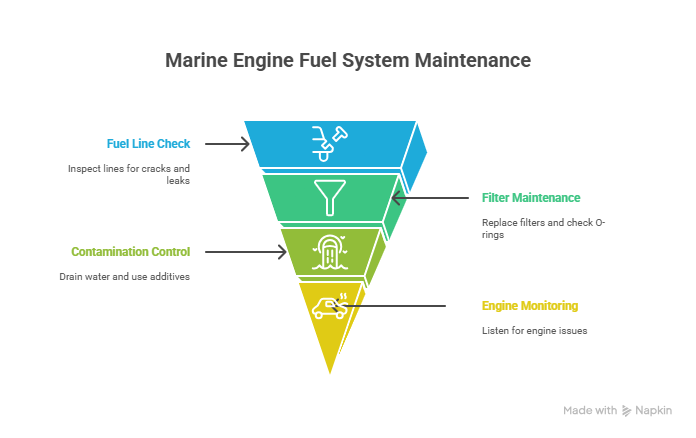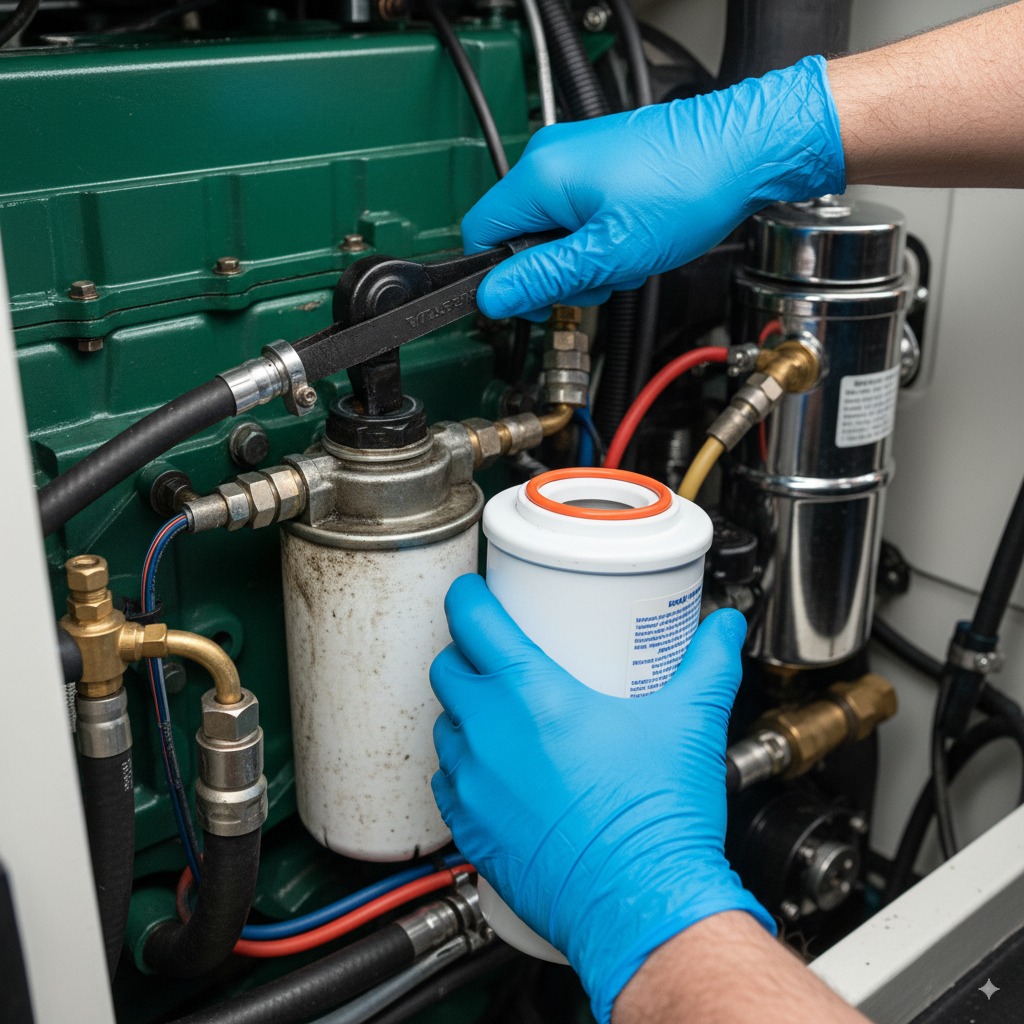The Day a Clogged Injector Almost Ruined a Perfect Trip
I’ve been wrenching on boats in Miami for 20 years, and let me tell you, most of the horror stories I hear don’t involve storms or sea monsters. They start with a cough. A sputter. And then, silence. Last summer, a guy named Javier called me in a panic. He was in his Sea Ray 320, dead in the water just off Stiltsville. The engine would turn over but wouldn’t catch. Classic fuel starvation.
When I got to his boat, the problem was obvious: clogged fuel injectors. The cause? He hadn’t changed his fuel filters in three seasons. A ten-dollar part and twenty minutes of work could have saved him a thousand-dollar tow and a ruined family outing. That day was a masterclass in why fuel system maintenance in marine engines isn’t just a suggestion on a checklist—it’s everything.
Your engine’s fuel system is its lifeline. Ignore it, and it’ll get you back, usually at the worst possible moment. But if you give it a little attention, it’ll be the most reliable thing on your boat. So, let’s talk about what really matters, from one boater to another. No fluff, just the straight talk on keeping your engine fed and happy.
Table of Contents
What’s Really Going On: From Your Tank to the Engine
I tell everyone the same thing: to fix something, you have to understand it. Think of the fuel’s journey. It starts in the tank, gets pulled through lines and a water-separating filter (your first line of defense), is pushed by a fuel pump, goes through another filter right on the engine, and finally gets atomized by injectors or mixed in a carburetor.
Every one of those points is a potential failure. A cracked hose, a loose clamp, a gummed-up filter—that’s all it takes. This is the core of fuel system maintenance in marine engines: spotting these weak links before they break.
The fuel itself is a huge factor. Diesel is notorious for growing “diesel bug” (microbial slime) in our humid Florida climate. And gasoline with ethanol? Man, that stuff can be a nightmare. It absorbs water right out of the air, which then separates in the tank, and it loves to eat old rubber fuel lines. Effective fuel system maintenance in marine engines means knowing what you’re up against.
My Onboard Checklist: The Stuff I Never Skip
Proactive care is what separates a pleasant day on the water from a call to TowBoatUS. Here’s the simple stuff I check on every boat I service, and it’s the foundation of good fuel system maintenance in marine engines.
1. Eyes on Everything
Once a month, open the engine hatch and just look.
- Lines and Fittings: Run your fingers along the fuel lines. Feel for soft spots, cracks, or brittleness. Look for any tell-tale sheen of fuel around fittings. A single drop means trouble.
- Clamps: Are they rusty? Are they tight? A loose clamp is an air leak waiting to happen, which will starve your engine.
- Vents: Make sure the fuel tank vent isn’t clogged with a mud dauber’s nest or salt crystals. A blocked vent can create a vacuum and stop fuel flow completely.
2. Filters Are Your Religion
Clean fuel is life. I’m a fanatic about filters because they are the cheapest insurance you can buy.
- Change ‘Em Often: Engine manuals say every 100-300 hours or annually. I say do it at the start of every season, no matter what. It’s a small price to pay.
- Always New O-Rings: Reusing the old gasket on a fuel filter is asking for a leak. Don’t do it.
- Cut Open the Old One: This is a pro tip. I cut open every old filter I remove. The gunk inside tells me a story about the health of the fuel tank. If I see a lot of slime or rust, I know we have bigger problems. This is a key diagnostic step in fuel system maintenance in marine engines.

3. Fight Contamination
Water is your number one enemy.
- Drain the Separator: That little bowl on your primary filter? Check and drain it every single trip. If you see more than a few drops of water, you need to find out where it’s coming from.
- Use Additives (Smartly): For diesel, a good biocide is essential in Florida to prevent microbial growth. For gas, a stabilizer is a must if the boat is going to sit for more than a month. These additives are a crucial part of modern fuel system maintenance in marine engines.
To give you an idea of what I’m talking about, here’s a quick table I put together from jobs I’ve done around Miami. It shows how small issues become big bills.
| Common Failure I See | Likely Cause | Average Repair Cost (Miami) | My Two Cents |
|---|---|---|---|
| Clogged Injectors | Old/dirty fuel filters | $800 – $2,500 | A $20 filter could have saved this. Total pain. |
| Fuel Pump Failure | Debris from a dirty tank | $600 – $1,800 | The pump overworked itself to death. |
| Engine Stalling | Water in the fuel | $200 – $500 (if caught early) | Usually just a filter drain and fresh fuel. Easy fix if you catch it. |
| Leaking Fuel Line | Old, ethanol-damaged hose | $150 – $400 | This isn’t just a breakdown risk; it’s a fire hazard. |
When to Call a Pro (Like Me)
You can do a lot of this yourself, but you need to know when to put the tools down.
Listen to Your Engine
Your engine will tell you when it’s sick.
- Hesitation or Power Loss: If the boat feels “lazy” or stumbles when you accelerate, that’s often a fuel delivery issue.
- Hard Starting or Rough Idle: If it takes a few tries to get it running or it idles like a paint shaker, your fuel system is probably crying for help.
- The Smell of Fuel: If you smell raw fuel in the bilge, stop everything. Turn off all power. That’s not a DIY job; that’s a phone call to a professional. Immediately. This part of fuel system maintenance in marine engines is about safety, not just mechanics.
The “Get-Home” Kit
I tell all my clients to have a small emergency kit. It should have at least:
- Two spare primary and secondary fuel filters.
- A filter wrench.
- Extra O-rings and clamps.
- A small length of fuel hose and a couple of hose barbs.
Proper fuel system maintenance in marine engines includes being prepared for the unexpected.
FAQ: Quick Answers I Give at the Dock
How often should I really change my fuel filters?
Honestly? More often than you think. At the very least, once a season. If you use your boat a lot or get fuel from different marinas, maybe twice a season. It’s cheap insurance.
Is ethanol-free gas worth the extra cost?
For older boats with original fuel lines, absolutely. For newer boats built for it, it’s less critical, but I still prefer it. It eliminates a whole category of potential problems related to fuel system maintenance in marine engines.
What’s the one fuel additive everyone should use?
For diesel, a biocide. For gasoline that sits, a stabilizer like STA-BIL or Pri-G. Don’t go crazy with a cocktail of additives; just use the right one for the job.
Can I clean my own fuel tank?
I wouldn’t recommend it for a full-on cleaning. It’s a messy, hazardous job that involves dealing with flammable fumes. A professional “fuel polishing” service is safer and more effective.
What’s the #1 mistake boat owners make?
Ignoring water in the fuel. They see a little in the separator bowl and just drain it without asking why it’s there. That water is a symptom of a bigger problem, like a bad deck fill O-ring.
The Bottom Line: Keep It Clean
At the end of the day, fuel system maintenance in marine engines boils down to one simple idea: keep the fuel clean and flowing. It’s not black magic. It’s just routine attention.
- Look and Touch: Put your eyes and hands on your system regularly.
- Trust Your Filters: Make them your best friend. Change them religiously.
- Fight Water: Be vigilant about draining your separator.
- Be Prepared: Carry spares and know the early warning signs.
- Know Your Limits: Don’t be afraid to call a pro when you’re out of your depth.
Start today. Go check your filter change date in your log (you do have a log, right?). Take a look in your separator bowl. These small steps are what will keep you out on the water, enjoying the day, instead of on the phone with me.
Author Bio
I’m Alex, a 20-year marine technician in South Florida, ABYC-certified. I’ve specialized in fuel system maintenance in marine engines for everything from small outboards to large diesel sportfishers. From clogged injectors at Dinner Key to fuel pump replacements off Bahia Mar, I’ve seen firsthand what happens when fuel systems are neglected—and how reliable they can be with proper care.


Leave a Reply